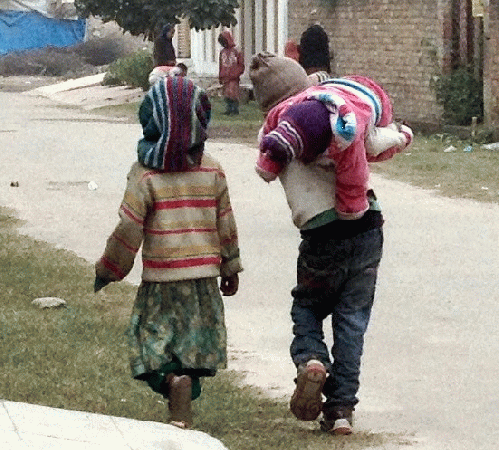
girls too have the right to enjoy the fruits of sustainable development where no one is left behind.
(Image by CNS) Details DMCA
Adolescence or teenage is that critical phase when one transitions from childhood to adulthood. It is marked by important biological changes and the onset of puberty. This 'growing up' is also about experiencing the joys and challenges of youth. However, for many girls especially those living in rural India, growing up in patriarchal socio-cultural set ups also signifies the tightening of an increased set of regressive controls on their lives, including the denial of going to school. Even after more than a decade of the passing of the Right to Education (RTE) Act in 2009, 37% of girls of age 6 and above in rural areas have never been to school, as per National Family Health Survey (NFHS)-4 data. Also nearly 40% of rural women aged 15-49 years are illiterate (as against 17% men) and even among those who are literate a mere 27% have 10 or more years of schooling.
This denial of the basic right to education to young girls simply helps to perpetrate regressive gender practices, weaving a web of economic, cultural and social controls and restrictions on their lives, as they transition from childhood to adolescence and beyond.
A recent study conducted in rural parts of Jharkhand state of India highlights the dreadful consequences of the interplay of these factors, resulting in an intensification of regressive norms and practices impacting the lives of adolescent girls.
Nalini Khurana, Senior Research and Programme Associate at International Centre for Research on Women (ICRW), Asia, presented the findings of this qualitative and quantitative study (conducted with adolescent girls and boys and their parents) at the fourth online session of the 10th Asia Pacific Conference on Sexual and Reproductive Health and Rights (APCRSHR10 Virtual).
Education: Jharkhand is a backward state of India where 49% of the rural women (aged 15-49 years) are illiterate and only 20% have 10 or more years of schooling. Also, the percentage of girls over 6 years of age in rural areas who ever attended school is 56%.
Study results show that school drop-out rate is high, rising sharply after age 15, with only 50% of 15-18 year old girls in school. Barriers are many-expenses; school too far; domestic work; girls' education is still not a priority for many parents. Gender roles influence family decisions around allocating resources for the girls' education. Due to limited resources parents rather invest in educating their sons - who are supposedly the future breadwinners for the family - rather than educate their daughters who will get married off into another family and will primarily assume a domestic role there.
This is what some of the female respondents had to say:
- "My family believes that what is the use of education when girls are destined to get married and to not have a career. Being able to write one's name and address is enough."
- "Parents think that if girls study more, they will get spoiled and will do of their mind and bring infamy to the family"
(Note: You can view every article as one long page if you sign up as an Advocate Member, or higher).





